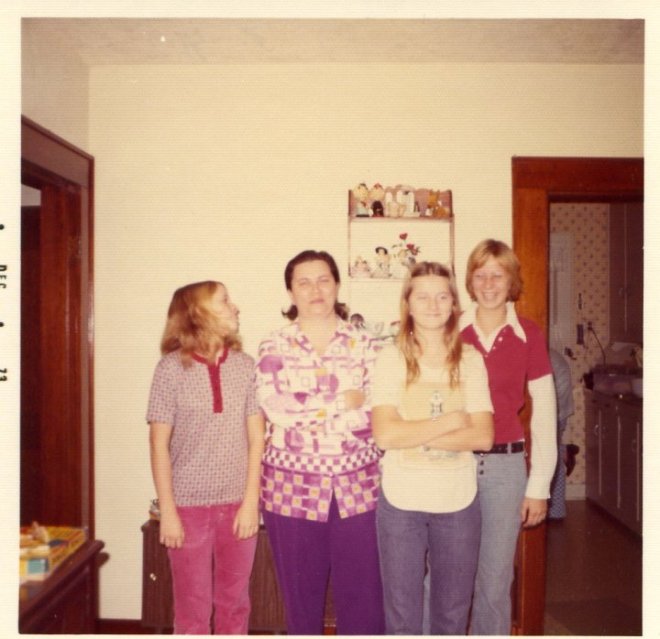Say just a simple ‘Yes, I will’ or ‘No, I won’t.’ Your word is enough. To strengthen your promise with a vow shows that something is wrong. Matthew 5:37
When I was a teenager, one of my mom’s best go-to answers for many of my adolescent requests was “well maybe, I guess.” It was standard issue, when I asked her permission to do something or go somewhere that she was skeptical about. It drove me crazy because I didn’t consider it a “real” answer. Actually, it was the perfect non-answer. It gave me hope while giving her an out at the same time. It was a way to deflect, to not commit, because it wasn’t exactly yes or no. Over time, I came to realize that what she really meant was “no” and for whatever reason, she just didn’t want to say it outright.
Sometimes, as believers, I think we’re a lot like my mom was with me back then. We can be dubious about what we think the outcome should or could be, so we say “well maybe, I guess,” too. It’s a way to keep our options open, a way to have things on our terms, especially when we don’t agree with what God has in mind, with His timing, with the people He brings into our lives and the things He uses to to accomplish His purposes. We get too caught up in trivial things, or better, yet, we get too full of ourselves to remember who is He is and what He can do…”He leads forth the starry host by number; He calls each one by name. Because of His great power and mighty strength, not one of them is missing” (Isaiah 40:26). We doubt His intentions. We doubt His faithfulness.
One thing I’ve come to have no doubt about is this: God is true and faithful to His word. He says what He means, and He does what He says. He tells us exactly how it is – do this and that happens, do that and this happens – straight up, no sugar coating. We are the ones who play games with words, who “tweak” their meanings to fit our idea of what is good and true. We even try to use His words against Him, twisting them to suit what we want, saying things like, “you say ‘ask and it will be given to you,’ but you still haven’t given me what I’ve asked for,” never realizing that what we’re really asking is for Him to bow down before us, to acquiesce to our will.
Now that mom is in full-blown dementia, she uses her old stand-by a lot. She says “I guess” because she can’t remember, and is therefore unsure, and sometimes that doubt is expressed in emotional outbursts. As I watch her slip further and further into the abyss, I have a new appreciation for the breadth of God’s love for us. It brings to mind 2 Peter 3:9 which says, “The Lord does not delay his promise, as some understand delay, but is patient with you, not wanting any to perish but all to come to repentance.” We can be so defiant and “stiff-necked,” and no matter how many times we deny we know him, He’s still there, standing beside us, patiently forgiving our doubts, helping us when we cry out to Him. He’s willing to wait, to take the insults, the accusations, the disbelief. He’s willing to die for us – that’s how much He loves us – even when we tell Him, “well maybe, I guess! “



 In our family, we make aepfel skivers on Christmas morning – it’s tradition. It got me to thinking about how many other things we associate with Christmas that are simply tradition, man-made precepts, which are not exactly biblical.
Many Christians like to say, “Jesus is the reason for the season,” but this is, in fact, is a mere half-truth. The book of Luke states this about the night Christ was born; “In the same region, shepherds were staying out in the fields and keeping watch at night over their flock.” (Luke 2:8) Generally, shepherds only stay out with their sheep at night two times a year, in the late summer when the sheep are mated, or in the early spring when the lambs are born. Anyone who is familiar with animal husbandry, can tell you that mating season can be managed without camping out in the fields, but birthing is a different story. Babies – whether human or animal – are born when they are born, and more times than not, it’s the middle of the night, suggesting that the time of year when Christ was born was in early spring, “as shepherds watched their flock at night.”
We celebrate the “Nativity of the Christ Child,” which is what early Christians called it, on December 25th bcause it’s a tradition; a tradtion based upon something other than what the Bible teaches. In the early “church” only the anniversary of Christ’s death was revered, as was the death of all the martyrs, but the early Bishops, who it seems would say just about anything to get the pagans to convert, started reasoning that perhaps Christ’s birth coincided with the Roman celebration of the Winter Solstice which was December 25th. Because Christ, reasoned Augustine of Hippo, ” for symbolic reasons,” would choose to be born on that day – the Winter solstice, when the sun begins to bring the light back into the world.
Since then, more and more “traditions” have been added over the centuries –wise men arriving at the manger (they in fact arrived at the “house where they saw the child and his mother Mary…” Matt 2:11), evergreen trees decorated with brightly colored “witch” balls and set ablaze with light, mistletoe, holly, St. Nick/Santa, giving of gifts, reindeer and elves, songs about chesnuts and snow – layer upon layer of blending that which is holy with that whih is not.
Today, as millions of people across the world gather to celebrate the tradition of Christmas, I would submit this for consideration:
In Matthew 15, Jesus asks the Pharisees, “And why do you, by your traditions, break the direct commandments of God?” Telling them further that Isaiah had it right about them when he prophesied, “Their worship is a farce, for they teach man-made ideas…” Paul also addresses the subject of following man-made ideas when he states in 2 Timothy 4:3-4, “For the time will come when people will not tolerate sound doctrine, but according to their own desires, will multiply teachers for themselves because they have an itch to hear what they want to hear. They will turn away from hearing the truth and will turn aside to myths.”
And I wonder, with all of the “traditions” we hold dear about Christmas, traditions that even non-believers celebrate, have we turned aside to myths, because it pleases our itchy ears? Something to ponder, to seriously and thoughtfully consider so that we do not find ourselves amongst the Loadiceans, thinking “we are rich” when we are in fact “wretched, miserable, poor, blind and naked, neither hot nor cold and must be spit out of the Lord’s mouth.”
~SLM
In our family, we make aepfel skivers on Christmas morning – it’s tradition. It got me to thinking about how many other things we associate with Christmas that are simply tradition, man-made precepts, which are not exactly biblical.
Many Christians like to say, “Jesus is the reason for the season,” but this is, in fact, is a mere half-truth. The book of Luke states this about the night Christ was born; “In the same region, shepherds were staying out in the fields and keeping watch at night over their flock.” (Luke 2:8) Generally, shepherds only stay out with their sheep at night two times a year, in the late summer when the sheep are mated, or in the early spring when the lambs are born. Anyone who is familiar with animal husbandry, can tell you that mating season can be managed without camping out in the fields, but birthing is a different story. Babies – whether human or animal – are born when they are born, and more times than not, it’s the middle of the night, suggesting that the time of year when Christ was born was in early spring, “as shepherds watched their flock at night.”
We celebrate the “Nativity of the Christ Child,” which is what early Christians called it, on December 25th bcause it’s a tradition; a tradtion based upon something other than what the Bible teaches. In the early “church” only the anniversary of Christ’s death was revered, as was the death of all the martyrs, but the early Bishops, who it seems would say just about anything to get the pagans to convert, started reasoning that perhaps Christ’s birth coincided with the Roman celebration of the Winter Solstice which was December 25th. Because Christ, reasoned Augustine of Hippo, ” for symbolic reasons,” would choose to be born on that day – the Winter solstice, when the sun begins to bring the light back into the world.
Since then, more and more “traditions” have been added over the centuries –wise men arriving at the manger (they in fact arrived at the “house where they saw the child and his mother Mary…” Matt 2:11), evergreen trees decorated with brightly colored “witch” balls and set ablaze with light, mistletoe, holly, St. Nick/Santa, giving of gifts, reindeer and elves, songs about chesnuts and snow – layer upon layer of blending that which is holy with that whih is not.
Today, as millions of people across the world gather to celebrate the tradition of Christmas, I would submit this for consideration:
In Matthew 15, Jesus asks the Pharisees, “And why do you, by your traditions, break the direct commandments of God?” Telling them further that Isaiah had it right about them when he prophesied, “Their worship is a farce, for they teach man-made ideas…” Paul also addresses the subject of following man-made ideas when he states in 2 Timothy 4:3-4, “For the time will come when people will not tolerate sound doctrine, but according to their own desires, will multiply teachers for themselves because they have an itch to hear what they want to hear. They will turn away from hearing the truth and will turn aside to myths.”
And I wonder, with all of the “traditions” we hold dear about Christmas, traditions that even non-believers celebrate, have we turned aside to myths, because it pleases our itchy ears? Something to ponder, to seriously and thoughtfully consider so that we do not find ourselves amongst the Loadiceans, thinking “we are rich” when we are in fact “wretched, miserable, poor, blind and naked, neither hot nor cold and must be spit out of the Lord’s mouth.”
~SLM



